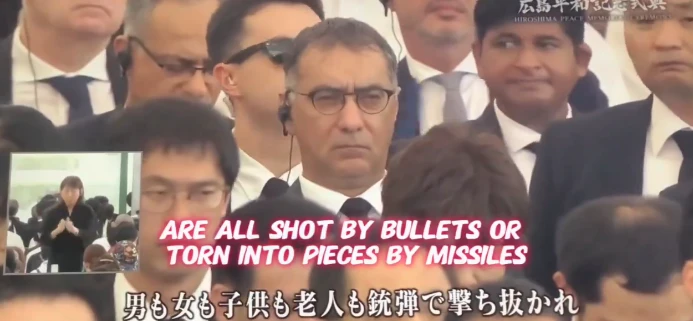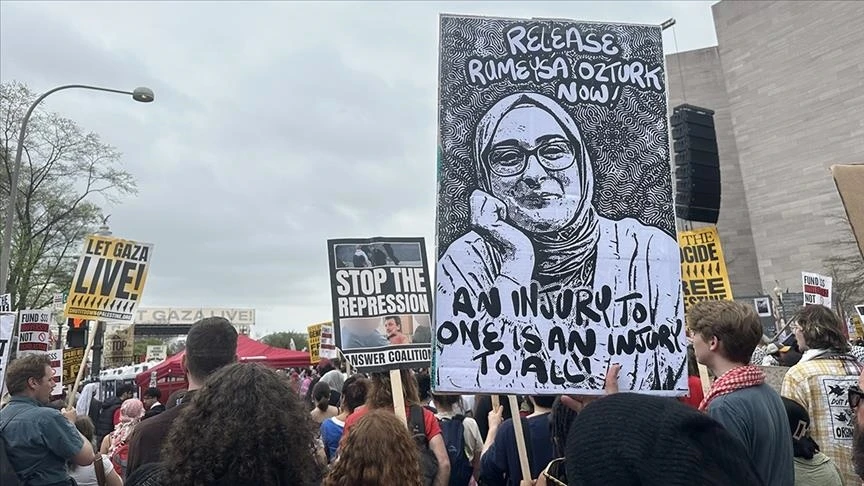Hiroshima governor indirectly criticizes Israel during anniversary
 The Israeli ambassador to Japan Gilad Cohen listening to the speech by the Hiroshima governor Hidehiko Yuzaki. (Photo via X)
The Israeli ambassador to Japan Gilad Cohen listening to the speech by the Hiroshima governor Hidehiko Yuzaki. (Photo via X)
Hiroshima Governor Hidehiko Yuzaki indirectly criticized Israel and other countries engaging in wars against civilian populations on the 79th anniversary of the Hiroshima bombing.
Officials in Hiroshima have urged the abolition of nuclear arms to reduce the risk of atomic war amid global tensions.
The city, devastated by a U.S. nuclear bomb 79 years ago, serves as a stark reminder of the catastrophic consequences of nuclear warfare.
Yuzaki made a passionate plea to world leaders for the elimination of nuclear weapons during a ceremony marking the anniversary.
“As long as nuclear weapons exist, they will surely be used again someday,” Yuzaki said at the Hiroshima Peace Memorial Park.
“Nuclear weapons abolition is not an ideal to achieve far in the future. Instead, it is a pressing and real issue that we should desperately engage in at this moment since nuclear problems involve an imminent risk to human survival.”
Global conflicts highlight urgency
Hiroshima’s Mayor Kazumi Matsui emphasized how ongoing conflicts are normalizing the use of military force. Matsui pointed to the wars in Ukraine and Gaza, which are claiming countless innocent lives and destabilizing daily life.
“These global tragedies are deepening distrust and fear among nations, reinforcing the public assumption that to solve international problems, we have to rely on military force, which we should be rejecting,” Matsui stated.
Solidarity and Criticism
Students from the All Japan Student Self-Government Association showed solidarity with the people of Palestine in front of the Atomic Bomb Dome, asserting, “Israel is not welcome here in Hiroshima. We will fight till the end.”
Governor Yuzaki indirectly criticized Israel and others engaged in wars against civilian populations, with the cameraman lingering on Israel’s Ambassador to Japan Gilad Cohen as Yuzaki condemned war crimes and violations of international law.
A solemn remembrance
The ceremony in Hiroshima was attended by approximately 50,000 people, including Japanese Prime Minister Fumio Kishida. Attendees observed a minute of silence at 8:15 a.m., the time when a U.S. B-29 bomber dropped the atomic bomb on the city.
The commemorative event comes shortly after Japan and the U.S. reaffirmed Washington’s commitment to “extended deterrence,” which includes the possible use of atomic weapons to protect its Asian ally amid growing regional tensions. This open discussion of nuclear deterrence marks a significant shift in Japan’s stance, considering it is the only nation to have suffered atomic attacks.
Historical context: Hiroshima and Nagasaki
On Aug. 6, 1945, the U.S. detonated a nuclear bomb over Hiroshima to force Japan to surrender, leading to the deaths of around 140,000 people. Days later, a second nuclear bomb hit Nagasaki, killing approximately 74,000 people. These attacks prompted Japan’s surrender on Sept. 2, 1945.



